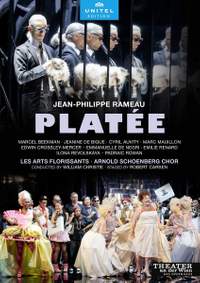Interview,
Jeanine De Bique on Mirrors
 A month on from its release on Berlin Classics, I'm still very much under the dazzling spell of Jeanine De Bique's debut solo recording Mirrors, which sees the Trinidadian soprano pairing snapshots of Handel's Cleopatra, Alcina, Agrippina, Deidamia and Rodelinda with their counterparts in lesser-known operas by Telemann, Graun, Broschi and Manna.
A month on from its release on Berlin Classics, I'm still very much under the dazzling spell of Jeanine De Bique's debut solo recording Mirrors, which sees the Trinidadian soprano pairing snapshots of Handel's Cleopatra, Alcina, Agrippina, Deidamia and Rodelinda with their counterparts in lesser-known operas by Telemann, Graun, Broschi and Manna.
I spoke with Jeanine at the end of last month about the role which Handel's heroines have played in her career to date, the parallels and contrasts between his settings and those of the other four composers featured on the album, and the process of bringing some of these characters to life with a range of different directors on stage over the past couple of years...
Where are you at the moment, and how does it feel to get back to performing to live audiences again?
I’m in Paris, in between performances of Robert Carsen’s production of Alcina, which opened on 25th November. It’s a role debut as well as a house debut for me, so between singing at this magnificent theatre and the release of my very first album it’s been such an exciting turn of events – for the past couple of weeks I’ve been like a kid with candy for the first time!
How did you come up with the concept for the album?
We considered various ideas but eventually settled on Handel being the foundation, since he’s the composer that I’m the most familiar with out of all my repertoire; our next challenge was how to avoid this becoming just another Handel arias album, because there are plenty of those around already! We wanted to make something that was unique to my voice, style and personality as well as creating a programme that would hopefully intrigue the listener and lead them towards music that they hadn’t heard before, rather than just introducing me as the product.
My friend and colleague Yannis François, the musicologist who really conceptualised this album, came up with the beautifully simple idea of looking at composers who were contemporaries of Handel and set the same libretti. Most of the operas by the four other composers are not as well known as Handel's settings, and this is the first time that they’ve been placed side-by-side on an album.
How much of the repertoire here was unfamiliar to you before the recording?
Some of the Handel heroines (like Rodelinda, Alcina and Cleopatra) were already very familiar, and those arias were my base – I would never want to do an album where all of the repertoire was new to me, and as this was my debut recording I was especially keen to go into the studio with a core of music that was already comfortable. But Handel’s Deidamia was new, as were all of the arias by the four other composers: Telemann, Manna, Broschi and Graun. And the other thing that is new is all of the ornamentation, for every single aria!
And do you like to write your own ornamentation?
I do play around with my own different variations but I usually have help from a few trusted persons that know my voice well. For this album I was fortunate to have Luca Quintavalle, my musical director, who, not prior to meeting before this recording project, collaborated with me on the ornaments and they fit my voice perfectly. Two other colleagues of mine, David Bates and Antonio Giovannini, also made contributions.
Were they any pairings on the album where a particular composer’s approach to a character struck you as radically different from Handel’s?
Oh yes, Graun in particular is a very intricate composer. I was recently speaking with a colleague who’s also had the opportunity to sing some of his work, and she said ‘Brava to you, Jeanine, because Graun is a really intense and difficult composer – his coloratura is not to be underestimated!’. That’s absolutely true: with Handel’s coloratura you generally have some idea of where he’s going, whereas with Graun you’re never entirely sure, especially in ‘L’empio rigor del fato’ [from Rodelinda]. And his ‘Tra le procelle’ [from Cleopatra e Cesare] is simply one of the most rocked-out pieces I’ve ever heard – I adore singing it, because it feels like my voice just flies! That was my introduction to Graun, and I’m so eager to explore more of his music because it’s such a challenge to explore how he thought – dramatically and musically, he’s very different from Handel.
I thought it would be interesting to have these two settings of ‘Mi restano le lagrime’, partly because of the historical background; as you may know, Broschi composed in the rival theater of Handel's theater, and Handel was influenced by the story from Broschi's opera of L'isola d'Alcina to write his own opera Alcina. ‘Mi restano’ was composed for another character in Broschi’s version, and I think you can really hear that when you listen to the two versions alongside one another. Both are incredibly beautiful, and I actually couldn’t choose between them because they both convey the intention and meaning of the words so very vividly.
You mentioned that Handel’s been the mainstay of your repertoire to date – how far back does that association go?
My first role at the Manhattan School of Music was Semele – just in a concert-version, but it was so fun to sing! That was my first introduction to Handel, and also my first experience of singing baroque music in English: in conservatories the world over we learn the Italian way of singing first, and switching over to that English baroque style was quite a challenge. I was taken by surprise by how difficult I found it: English is my first language, but somehow the words fit with the music so differently and you need a very particular approach to make the text work with the musical line.
French baroque is a different animal altogether, but the same thing applies there too: perhaps it’s slightly easier on one level if you’re a native speaker, but even so there’s a very specific style to French baroque and not every French person can do it. You need such a comprehensive understanding of the style - how to trill, where to place the vowels etc – but I do adore singing that repertoire. Last year we did Platée (another Robert Carsen production) at Theater an der Wien, and that was another fascinating undertaking…I’d love to have another opportunity to perform that role or any suitable Rameau, because French baroque is just so beautiful.
You’ve sung several of the Handel roles which feature on the album in staged productions: have the various directors you’ve worked with given you different perspectives on his heroines?
Giulio Cesare was actually my last production pre-COVID, at the Theater St Gallen in Switzerland; we were just a week away from opening when the first lockdown happened, but they managed to reschedule some performances once the country opened up again so I did eventually get to sing the role four times on stage.
It was a very colourful production, with elaborate costuming and sets and a strong emphasis on fantasy – you have the Robert Carsens or the Peter Sellarses of the world who tell these stories through the lens of contemporary reality, but this was very much a fantastical vision of Cleopatra and Egypt. That’s not to suggest that we weren’t also very invested in the text: our director [Fabio Cerasa] is Italian and he knew every single line of the libretto by heart, to the extent that if any one of the cast was absent in rehearsal he would jump in and play the role himself!
Actually, all of the Handel opera productions I’ve done have been quite stylised, but in very different ways. The Rodelinda I did in Lille used puppets, because the director wanted to look at the characters through a child’s eyes. And now I’ve come to Robert Carsen’s Alcina, where the design is quite minimal and one sees the characters more exposed. In this particular production you empathise with Alcina as opposed to seeing her just as a witch. The audience is privy to witness a woman they recognise from their own experience that has become the subject of her own deceit to garner what she really wants, love.
Speaking hypothetically, what would be your dream-roles for the next decade of your career?
It's a tough question to answer, especially when the current cultural climate is volatile and ever changing. I have dreamt about theaters that I’d love to perform in, but honestly the most important thing for me is to continue using the gift that I was given for peace, healing, representation, love and community building. The long term goal is not to ensure that I sing certain roles (for example Pamina or Cendrillon) in a certain time frame. There is no hurry. When an opportunity to sing a new role arises, I carefully read the score to see whether it would suit my voice and character and whether I can bring something interesting to the character, then I would say yes!
That said, I would class some of the things that have already happened as ‘dream roles’, including Alcina: in fact I bought my Alcina score when I was still in school! I’d already done Semele, Adele in Fledermaus and Soeur Constance in Dialogues des Carmélites, and was looking at roles that I should just study; then one day I heard a colleague of mine at school sing one of Alcina’s arias and I thought it was just amazing. I kept the score in my music-trunk for many years, and it seems it was almost providential when this incredible opportunity arose to sing it at the Opéra de Paris.
Jeanine De Bique (soprano), Concerto Köln, Luca Quintaville
Available Formats: CD, MP3, FLAC
Marcel Beekman (Platee), Jeanine De Bique (La Folie), Cyril Auvity (Mercure/Thepsis), Marc Maullon (Momus/Citheron), Edwin Crossley-Mercer (Jupiter), Emmanuelle De Negri (Clarine/Amour), Emilie Renard (Junon), Ilona Revolskaya (Thalie), Padraic Rowan (Mommuss/Satyre)
Les Arts Florissants, Arnold Schoenberg Chor, William Christie, Robert Carsen
Available Format: 2 DVD Videos




